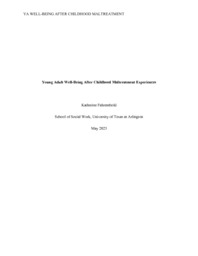
ATTENTION: The works hosted here are being migrated to a new repository that will consolidate resources, improve discoverability, and better show UTA's research impact on the global community. We will update authors as the migration progresses. Please see MavMatrix for more information.
Show simple item record
| dc.contributor.advisor | LaBrenz, Catherine | |
| dc.creator | Fahrenthold, Katherine | |
| dc.date.accessioned | 2023-06-14T17:04:37Z | |
| dc.date.available | 2023-06-14T17:04:37Z | |
| dc.date.created | 2023-05 | |
| dc.date.issued | 2023-03-30 | |
| dc.date.submitted | May 2023 | |
| dc.identifier.uri | http://hdl.handle.net/10106/31205 | |
| dc.description.abstract | The purpose of this study was to examine the relationship between adverse childhood experiences (ACE’s), attachment style, and well-being in transition-age youth. The study sought to address two questions; is the attachment style of young adults who have experienced maltreatment associated with well-being and overall adjustment in the transition to adulthood? What is the lived experience of young adults who have experienced child maltreatment as they transition to adulthood? An online survey containing questions about demographics, 3 validated measures (the ACE questionnaire, Revised Adult Attachment Scale, and the Mental Health Continuum Short Form), and expanded ACE item questions was administered to transition-age youth (ages 18-26) throughout the United States using convenience sampling. The sample (n = 99) was examined through bivariate correlations and multinomial regression models to assess for relationships between ACE score (traditional and expanded), attachment style, and well-being. Household composition was considered with the reference variable of “living with a romantic partner”. Gender and foster care status were examined for interaction in subgroup analyses. An optional follow-up interview was conducted with 3 interviewees for qualitative theme analysis. The sample had a high prevalence of fearful attachment style (n = 43, 43.4%) and languishing mental health (n = 44, 44.4%). ACE score (traditional and expanded) was positively correlated with languishing mental health in the transition to adulthood. Attachment style and living with a partner or spouse were not significantly associated with mental health. Gender and foster care status both had independent significant interactions with ACE score and mental health. Three themes were consistent throughout the interviews: unstable relationships, low self-image, and silver lining. Further research on assessing attachment style in transition-age youth is needed to accurately assess the impact on well-being in relationship to adverse childhood experiences. | |
| dc.format.mimetype | application/pdf | |
| dc.language.iso | en_US | |
| dc.subject | ACEs | |
| dc.subject | Child maltreatment | |
| dc.subject | Well-being | |
| dc.subject | Young adult | |
| dc.subject | Transition-age youth | |
| dc.subject | Attachment | |
| dc.subject | YA | |
| dc.subject | Mental health | |
| dc.title | Young Adult Well-Being After Childhood Maltreatment Experiences | |
| dc.type | Thesis | |
| dc.date.updated | 2023-06-14T17:04:38Z | |
| thesis.degree.department | Social Work | |
| thesis.degree.grantor | The University of Texas at Arlington | |
| thesis.degree.level | Masters | |
| thesis.degree.name | Master of Social Work | |
| dc.type.material | text | |
| dc.creator.orcid | 0000-0002-3601-6181 | |
Files in this item
- Name:
- FAHRENTHOLD-THESIS-2023.pdf
- Size:
- 795.4Kb
- Format:
- PDF
This item appears in the following Collection(s)
Show simple item record


